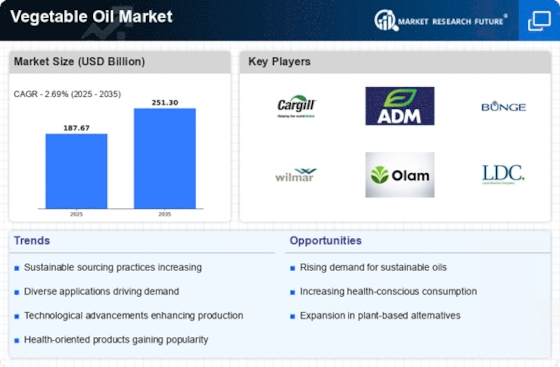Market Analysis
In-depth Analysis of Vegetable Oil Market Industry Landscape
The market for vegetable oil is one of the most active and important parts of the global food chain. A wide range of factors influence its complex dynamics. Vegetable oil, which includes oils produced from different plant sources such canola, soybean, palm, and sunflower, is vital to the food processing and culinary industries. The demand for edible oils around the world is one of the main factors affecting the vegetable oil industry. Vegetable oils are an essential component in cooking methods all around the world, appearing in a wide range of culinary uses. Their adaptability to a variety of cuisines and their capacity to accentuate tastes and textures greatly add to the steady and broad demand. Certain vegetable oils are becoming more well-liked due to their alleged nutritional advantages as eating habits change and cooking techniques become more health-conscious, which is changing market dynamics. The production of vegetable oils is heavily dependent on agricultural methods and crop yields, which has a significant effect on market dynamics. Yields of oilseed crops can be impacted by variations in weather, soil quality, and pest management techniques. For instance, changes in the production of soybean or palm oil brought on by weather-related incidents or changes in agricultural practices in important producing regions can create supply-side problems, which in turn can impact the pricing and availability of these oils in the market for vegetable oils. A number of economic factors, such as population growth and income levels, have a significant impact on the dynamics of the vegetable oil industry. Growing economies result in more disposable incomes and higher consumer expenditure on food, particularly oils. Moreover, as more individuals enter the consumer market, population increase raises the total demand for vegetable oils. The price of manufacturing costs, transportation costs, and raw materials are all impacted by economic conditions, which also have an impact on the market's overall pricing strategy for vegetable oils. The market dynamics in the vegetable oil business are largely influenced by the industry structure and competitive environment. Both smaller regional firms and major global enterprises compete in this market. To obtain a competitive edge, fierce rivalry encourages innovation in marketing tactics, packaging, and production techniques. Market dynamics are also greatly influenced by alliances and cooperative efforts between farmers, processors, distributors, and retailers along the supply chain.


















Leave a Comment